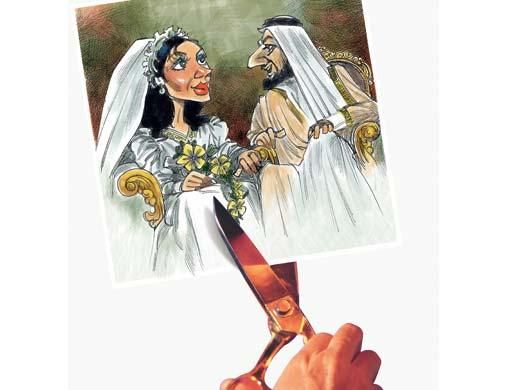Riyadh: The case of Fatima and her husband Mansour Al Taimani, which hit the Saudi press, internet websites and social gatherings for two years, was not an isolated case as some may think.
In July 2005, a judge in Al Jouf, in northern Saudi Arabia, nullified Fatima's marriage to Mansour following her family's allegation that Al Taimani had misled them about his tribal affiliations. The husband denied the charges. The couple has two children from their marriage.
Saudis are split on the issue with a majority supporting the couple and a minority on the side of the judge. Sociologists have warned of the repercussions of such cases, while religious men look at the situation as personal interpretive judgment that could be right or wrong.
This time, the tragedy shifted from north to east as a Sharia court in Ahsa in the Eastern province of the kingdom started to review a lawsuit filed by a brother of a 30-year-old female saying that members of his family have convinced a judge to divorce his sister on ground of incompatible status of the man.
Eighty relatives of the woman's family filed a suit and have succeeded in having the judge stop the marriage.
The brother of the divorced woman is angry about the ruling and filed
another suit asking the judge to restore the marriage and have the relatives sign an undertaking not to interfere in his family's affairs and pay compensation for the damages they incurred to the family.
Cancellation
In both Fatima and Mansour's case and the new case in Ahsa, the ruling was based on the principle that the status of the wife's family is considered superior to that of her husband's.
"From my close follow-up of the case of Fatima and Mansour, I believe that more similar cases of divorce on grounds of family and tribal inequality will emerge in Saudi society.
"The complicated trial affiliations in Saudi Arabia in addition to the non-existence of clear provisions in the Saudi judicial system to settle such cases will increase the rate, add to the complexity and prolong the period of ruling issuance," Badriya Al Abdul Rahman, A Saudi sociologist told Gulf News.
The woman, whose marriage was nullified and who identified herself by her initials A.A., said that she and her family were pressurised by their relatives to cancel the wedding after invitation cards were printed and a hall was reserved for the party.
She noted that a group of her relatives visited them and insisted that the marriage be cancelled as it may damage the reputation of the family.
She pointed out that the heath condition of her mother has deteriorated because of this case and as a result they buckled down and nullified the marriage contract.
Her mother told Gulf News that she was very surprised that members of the family are now intervening in her children's affairs though they have not been on good terms with them for years.
"I received no assistance from the ones who are now asking for marriage nullification. I have brought up my children alone after the death of their father and many of their relatives do not even know the names, the ages or even the features of my daughters," she said.
The would-be husband, identified as H.M., said that he accepted the nullification of the marriage contract due to the conditions and situations surrounding the case and fearing more trouble for the family and himself.
Ebrahim Al Bahry, the lawyer of the divorced woman, said that the nullification of the marriage has no Sharia or legal justifications as all marriage conditions were met and that they have filed a case in court to restore the marriage.
Meanwhile, Dhahran police have confirmed that they are investigating allegations of threats filed by A.A.'s family against some of their relatives.
For her part, Dr Salwa Al Khateeb, professor of sociology at the Riyadh-based King Saud University noted that the Saudi society is still a tribal society governed by customs and traditions.
"Asking about the would-be son-in-law is normal in all societies, but among some Saudis the question does not focus on the behaviour and attitude of the would-be son-in-law but about his family and tribal origin," she noted.
She added that in Saudi society there is discrimination according to tribal or family affiliations.
Shaikh Nasser Al Oboudi, professor of religion at Imam Mohammad Bin Saud Islamic University in Riyadh told Gulf News that equality in family affiliations under Sharia is not a condition for a valid marriage contract. He added that preference between people in Islam is the piety of Allah.











